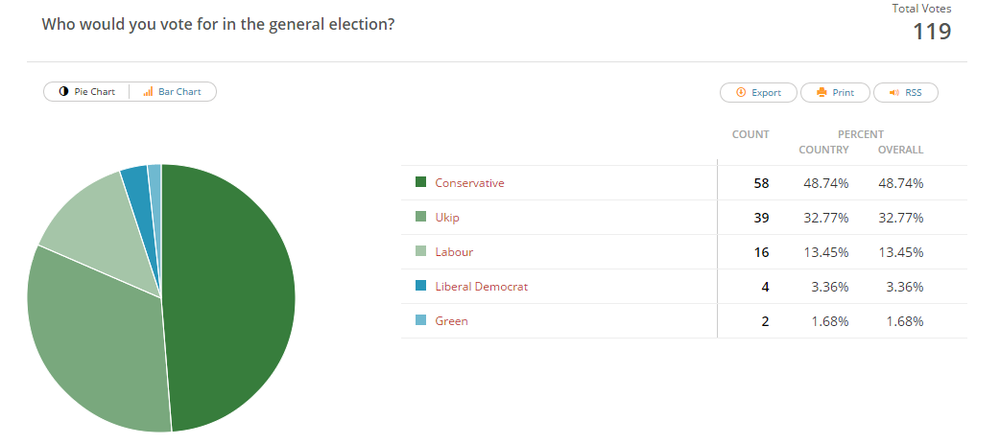- UK General Election taking place today
- Senior civil servant believes Jersey should be prepared for continued uncertainty and unexpected consequences, regardless of who triumphs
- Do a third of you really think that voting Ukip is the answer to Britains problems? Comment by Ramsay Cudlipp
JERSEY should be prepared for continued uncertainty and unexpected consequences, regardless of who triumphs in today’s UK general election, according to a senior civil servant.
In the run-up to polling day party leaders from all sides have pledged intentions to make gains for UK taxpayers by clamping down on the ‘tax haven’ Crown Dependencies of Jersey, Guernsey and the Isle of Man.
Notably, earlier this year Labour leader Ed Miliband threatened to put the islands on an international ‘blacklist’ if they did not agree to publish a register of the ultimate owners of registered companies within six months, berating Prime Minister David Cameron for not keeping an earlier promise to ‘force UK tax havens in Crown Dependencies to open up’.
Although Mr Miliband’s assertions are regarded by Jersey Finance and Assistant Chief Minister Philip Ozouf as little more than political posturing, Conservative leader David Cameron’s intention to bring a referendum on European Union membership in 2017 could have serious repercussions for Jersey’s relationship with the UK and Europe in the longer term, External Relations Minister Sir Philip Bailhache has said.
Other challenges to the Island’s financial services business include Labour’s plans to remove concessions to ‘non-doms’ – people living in the UK but taxed internationally, which relates to 12 per cent of Jersey’s financial services business – as well as a slower-than-expected increase in interest rates, and extensive banking reforms.
The States director of financial services in the Chief Minister’s Department, Joe Moynihan, said that whatever the outcome of today’s election, the Island would have to deal with it.
‘There has been a lot of noise going on, but not any concrete proposals as to what they mean, what it will look like, or how long it is going to take,’ he said.
‘We do have non-domicile business here, some of which is good for us, but not all of that is tax-driven. A lot of non-doms like the quality of the service and may want to protect their confidentiality for a number of reasons, and as a jurisdiction we do that pretty well.’
Asked about the proposed UK referendum on EU membership, Mr Moynihan said that Jersey had free movement of trade in the EU and that many areas would be affected if the UK was to leave.
He added: ‘Opinions are divided, but it would be a major challenge for us, from a Jersey plc perspective, because financial services are just a small part of it.’
Financial services is Jersey’s biggest employer, accounting for 12,700 workers, last year providing 42 per cent of the total tax take, of which the banking sector was by far the largest contributor.
Mr Moynihan, who formerly headed up Irish bank AIB in the Island and is now a member of the States Income Forecasting Group, said that the uncertainties in the UK and Europe had probably contributed to recent subdued forecasts for finance industry growth, even though around 700 more jobs had been created in the past year.
‘Hopefully that will start to filter through to corporate profit, but there is still a lot of uncertainty and a lot of things out of our control,’ he said. ‘As a government we’ve got to make sure the building blocks are in place and that the conditions are right, and that includes how we are seen and perceived.
‘At the moment, the feedback I’m getting is that people are busy for all the right reasons, although there are lots of challenges and external things that we are not able to control. But we have been there before and the industry has proven to be pretty resilient,’ he said.
‘Reputation is really important, as is legislation and an independent judiciary, along with good quality and experienced professionals. Over the last four to five years these things have become even more important and these are the things that clients and advisers will gravitate towards.’

Do a third of you really think that voting Ukip is the answer to Britains problems?
REALLY, Jersey? Really? According to the results of an online poll that we ran this month, 33 per cent of you – 33 per cent! – would vote for Ukip in the British general election.
Now, I wasn’t surprised that the clear winner in this poll was the Conservatives with 49 per cent. I know that the Daily Mail outsells all other national newspapers by a country mile and that the chances of getting a Guardian at your local corner shop are about as slim as seeing Boris Johnson give an honest answer to a straight question rather than just muddling his words for ten minutes in a manner that some people inexplicably find charming.

Yes, I’ve long accepted that Jersey is comfortably right wing, that the majority of people are still a bit prudish, don’t like swear-words or tattoos and think that the Island’s new discrimination law is ‘political correctness gone mad’. I’ve learned to live with the fact that the vapid Michael ‘I’m funny because I talk about things that
might have happened to you’ McIntyre will sell out the Opera House on a Tuesday night in eight minutes, while left-wing hero Stewart Lee will struggle to get more than
50 people on a Saturday.
We’ve learned to get along, me and middle Jersey. We might disagree on some things but at least we’re able to laugh about it and even have a healthy debate now and then.
But I wasn’t aware that things had slipped so badly in the last few years that more than three in ten of you would nail your flags to the Ukip mast.
No, I naively assumed that we were all on the same page when it came to Nigel Farage. That surname should be pronounced to rhyme with marriage, incidentally – not mirage. If he wants to live in a country stripped of all foreign influences then
he’s not getting away with having such a French-sounding name. (Not my joke, by the way. Full credit goes to comedian Mark Thomas, who has also started a wonderful game among his fans of asking people to suggest different definitions of the word ‘Farage’.
For example, one might say: ‘Blimey, you should have seen the Farage I did this morning. That vindaloo went through my system like an express train!’)
I thought we were all aware that the Ukip leader is nothing more than a deeply unpleasant, jingoistic hate-monger.
I definitely did not realise that things were so bad over here – that people are presumably so unhappy with the world – that they’d fallen for Farage’s disgusting rhetoric about ‘immigrants’ and ‘benefit cheats’.
I’ve always thought that, deep down, Jersey people have a strong affection for fairness, equality and standing up for the little guy. I’ve believed – or perhaps wanted to believe – that the racist mutterings you hear occasionally about our Portuguese or Polish residents are just people playing the role of the ignorant grump, that when push came to shove they would admit that they did not really bear a grudge.
Maybe I’m wrong. Maybe 33 per cent of Islanders genuinely think that Ukip’s policies are what we need in the modern world.
It’s a tricky time at the moment. We’ve learned in the past few weeks that Jersey is in the mire when it comes to our finances. By 2019, we will have a budget deficit of £125 million, if things don’t change.
It seems inevitable that we will see increased taxes, frozen salaries, job losses and services cut. In fact, Jersey might become a very unhappy place in the next few years, as the middle earners are squeezed to prop up the Island and replace the money that we should be getting through company tax (it seems that Richard Murphy was right all along about zero-ten crippling Jersey).
Then people will surely look for someone to blame as they struggle to pay for their mortgages and watch on in frustration as more ‘super-rich’ residents pour into the Island and erect ghastly eight-bedroom houses.
And there’s a danger that rather than blaming those who got us into this mess – the politicians who insisted that zero-ten was the only answer, the politicians who allowed the civil service to soar in numbers during a recession, the politicians who approved bigger and bigger salaries and bonuses for middle managers and executives – that they will turn to easier targets.
This is how Ukip thrives in the UK. (Well, thrives compared with a few years ago – most experts predict that they are still unlikely to win more than one seat this time round, even with the ‘Farage effect’.)
Ukip prey on unhappiness and difficult personal circumstances by giving people easy targets.
Can’t get a job?
That’s because immigrants take them all.
Public finances low?
That’s because so many benefit cheats are fiddling the system.
Long waiting lists at hospitals?
That’s because obese people are taking all the appointments.
The truth is that there are no easy answers to this mess.
But siding with people like Nigel Farage, Katie Hopkins and Richard Littlejohn – people who would have you believe that everything would be fine if we closed our borders, cancelled welfare payments and shot fat people – is a path that people in Jersey should be wary to tread.
We are in a delicate position and things will probably get worse before they get better.
More than ever we need to celebrate Jersey’s multi-cultural population and generous spirit – we’re going to need it when the Farage really hits the fan.






